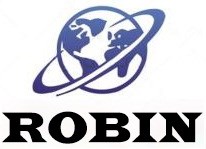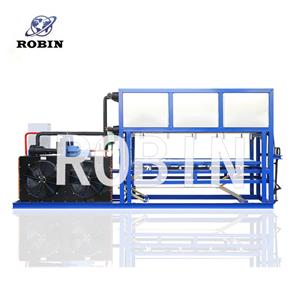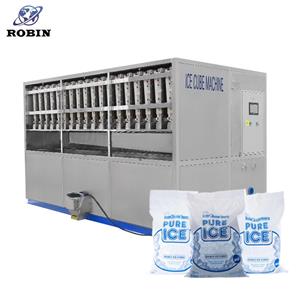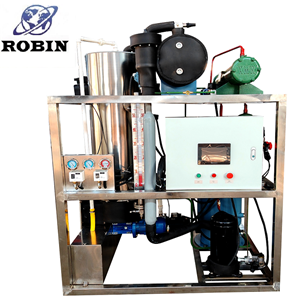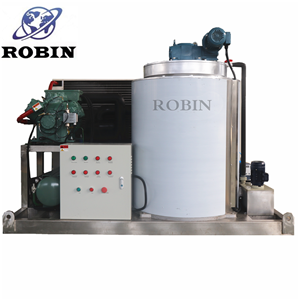Routine maintenance methods for tube ice machines
As we all know, whether it is the luxury brand Mercedes-Benz in the D-Class range or the expensive Phantom Rolls-Royce, regular maintenance and repairs are required in the 4S shop to keep it safe and long-lasting. As with branded cars, ice making equipment also requires regular maintenance to ensure stable operation and longevity.
During the long-term use of the equipment in different environments (including harsh environments), the wear and tear of the mechanical components, the increase in clearance and changes in the fit will directly affect the original balance of the equipment. The stability, reliability and efficiency of the equipment will be reduced to a considerable extent, and may even lead to the loss of its inherent basic performance of machinery and equipment, can not operate normally.
In this way, the equipment needs to be overhauled or replaced, which undoubtedly increases the cost of the enterprise and affects the rational allocation of resources. As the ice machine compared to other refrigeration equipment with higher technical content, so the use of ice machine environment and regular maintenance, for the life of the ice machine and ice effect is extremely important.
Cleaning
Water tank cleaning
The water tank and pump should be kept clean and free of any foreign material, but if sediment does appear (more foreign material or clay build-up), the tank should be thoroughly cleaned. If the machine has been out of service for more than a day, the tank should be cleaned before restarting to ensure quality ice production. The specific cleaning steps are as follows.
1. Stop the machine and switch off the mains power.
2. Release all water from the tank through the drain valve and clean the tank with detergent and a long-handled brush, rinsing it several times with water until it is free of dirt.
3. Fill with new water to the level when the float valve stops supplying water and turn on the machine.
Evaporation tube cleaning
In the case of long time use, there will be a small amount of dirt accumulated in the wall of the evaporation tube, which needs to be cleaned regularly. The frequency of cleaning depends on the water quality, in areas where the water quality is hard (high lime content in local water), it is necessary to clean every 3-6 months, while in areas where the water quality is normal or "soft", twice a year is enough. The specific cleaning steps are as follows.
1. Release the water from the tank first. Add water to fill the tank to a ninth of its capacity and close the water supply valve. Add 2.1 litres of high purity citric acid and mix it with the water.
2. Turn off the refrigeration compressor and close the liquid line shut-off valve; turn on the pump (without refrigeration) and run the cycle for about 2-3 hours. (Press "start cleaning" to clean; press "stop cleaning" to stop cleaning.)
3. After releasing the waste water, fill with new water and circulate for about 30 minutes to clean the residual detergent, then release the water a second time. Cycle twice or more to ensure that the detergent has been flushed out.
4. Open the water supply valve to restore the refrigeration system and return the machine to normal operation. Fill with fresh water to the level at which the float valve stops supplying water and the machine is ready for use.
Water-cooled condenser cleaning
During the operation of the condenser, the cooling water will produce scale inside the pipes, which will affect the heat transfer effect and should be cleaned frequently to improve the cooling efficiency. The frequency of cleaning depends on the water quality, in areas with very hard water, it is necessary to clean once every three months, while in areas with normal or "soft" water quality, cleaning is only necessary twice a year. The cooling system consists of the cooling water tower and the water-cooled condenser, which should be cleaned at the right time in order to ensure smooth operation and a long service life. The cooling water tower should also be cleaned at the right time to ensure the efficiency of the ice production.
The specific cleaning steps are as follows.
1. Stop the machine and clean the cooling water tower with a brush first.
2. If the cooling tower is higher than the condenser, the cooling tower should be emptied of water or the condenser and cooling tower inlet and outlet valves should be closed first.
3. Open the condenser end cover below the drainage ramp valve, the condenser in the water drainage.
4. Remove the end caps at both ends of the condenser. Use a special condenser brush to clean each copper tube back and forth, then rinse with water several times until clean.
5. Once clean, reinstall the end caps and connect the pipes.
Changing the compressor oil
When you see cloudy oil in the oil sight glass, the compressor oil needs to be changed. The compressor oil has been changed once before the unit leaves the factory and should be changed once a year thereafter.
Charging the refrigerant
When the equipment has low pressure protection or poor ice production, look for a refrigerant leak. If the low pressure is lower than 2kg, it means that there is a refrigerant leak, so it is necessary to find out the leak and weld it in time (to detect the leak, sprinkle soapy water on the refrigerant pipe, where there is a leak, there will be bubbles) and charge the refrigerant at the same time.
Refrigerant charging: When charging the refrigerant in the refrigeration system, the refrigerant cylinder with qualified quality should be weighed on the scale and recorded, and connected to the unit liquid injection valve with the connecting pipe (condenser and high pressure of the liquid storage tank should be added at the same time), and the refrigerant should be injected into the system by using the vacuum in the system. When the pressure in the system rises to 0.196~0.294MPa (2~3kgf/cm2), the system should be leak detected again. If there is a leak, it should be repaired after the leak is identified and the refrigerant should be recharged. When the system pressure is the same as the cylinder pressure, the compressor can be started and the charging speed accelerated until the refrigerant weight required by the system is met.
When charging the refrigerant during the start-up process, you can add it on the suction side of the compressor to ensure that it is refrigerant gas (Note: when charging the refrigerant, you must ensure that R404 is the refrigerant liquid and needs to be poured; when charging, pay attention to the suction side of the compressor and determine the refrigerant to be added according to the frost of the compressor to avoid wet compression and damage to the compressor; to avoid the liquid strike phenomenon, it is best to add the refrigerant from the condenser).
Regular inspection of the line
When the machine is running, it should be checked regularly whether the water solenoid valve can be closed normally, and the electric box and wiring should be checked regularly to ensure that there is no leakage and short circuit, etc. (2-3 months to do a comprehensive check).
Good maintenance of the machine and equipment plays a key role in the performance and life of the equipment. Ice machine equipment should have a dedicated staff (after our robin refrigeration training) maintenance management, customers need to pay attention to the maintenance staff after the change of new personnel training work, to ensure that the operation of the ice machine and maintenance work well carried out.
